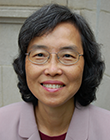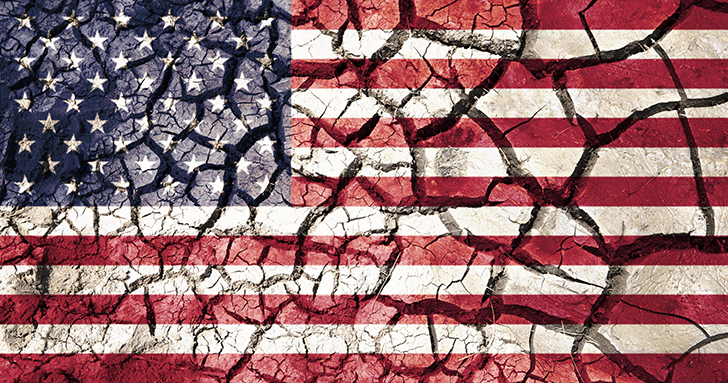Protest and Resistance in the Trump Era
I was in Greece when Donald Trump was elected president on November 8, 2016. I was there on a research trip and had just visited the Acropolis, the Agora, and several magnificent museums several days before that date. The fact that I was in Athens, the cradle of Western democracy, prompted me to think about the relationship between the struggle for democracy and empire. As a postcolonial theologian deeply interested in the relationship between religion, power, and empire, Trump’s election and his administration’s policies on border security—particularly the Muslim ban—and on healthcare, DACA, and tax reform demand serious theological reflection and acts of resistance.
For some, especially those in the Chinese media, the election of Trump showcases the dysfunction of democracy and the unreliability of populism. But seeing Trump’s election as an aberration is to miss the signs of our time. His slogan “Make America Great Again” appeals to the imperial impulse of many American people, especially working-class white men who perceive that they have lost much power. Trump enjoys the support of the Christian Right. Eighty percent of white evangelicals voted for him. Many of us might think that the Christian Right misinterprets the Gospel of Jesus Christ, who was himself a political prisoner under the Roman Empire. But we cannot forget the church’s historical complicity with empire and the lingering impact of Constantinian Christianity that has justified violence, colonialism, racism, war, and genocide in the past and in the present.
In Trump’s era of alt-truth and alt-reality, the vocation of an intellectual and a theologian is to speak truth to power. Inspired by the example of the Barmen Declaration during the rise of Nazism, a group of theologians issued the Boston Declaration, calling upon Christians to follow the Jesus way and condemn the false ideologies of empire building, as well as the myths of racism, Islamophobia, and American exceptionalism. It exhorts us to dismantle the legacy of white supremacy and to stand in solidarity with the vulnerable among us.
In mid-November of 2017, the College of the Holy Cross hosted a conference titled “Religion, Protest, and Social Upheaval,” which brought together a diverse group of scholars from across national and religious divides to examine the impact of religion on social and political movements. Organized around six themes—nationalism, immigration, race, gender, ecology, and economics—the conference aimed to illuminate the complex dynamics of religion in protest and social upheaval. The discussion at the conference had important insights for teaching and research for resistance in the Trump era. I would like to share some of the highlights. First, we have to engage in theological malpractice. In medicine, malpractice means that medical professionals may not have followed established protocols, and their negligence and failure to care for the patient lead to personal injury or wrongful deaths, but J. Kameron Carter gives malpractice a twist and a totally new definition. He discusses black malpractice in the context of anti-slavery movements and the civil rights movement. Malpractice means the refusal to follow established procedures and orders of things. Theological malpractice means the refusal to follow traditional ways of teaching theology, which separate doctrine from context, theory from practice, and the theological from the political. Malpractice implies “other” practices of teaching theology, practices that question and subvert the status quo and decolonize the mind. In this way, malpractice is internally generative and always points to the theological surplus or excess that cannot be contained or policed by traditional ways of conceptualizing and teaching theology. In the case of black malpractice, theologians must disengage from theologies that support white supremacy and teach black sacred practices.
Second, we have to double our effort to research and teach counter-mythologies. Empires always want to imagine that they are omnipotent, constantly expanding, and totalizing. In fact, empires are full of internal contradictions and are threatened by external competition. Our neoliberal economy proclaims that it has no centers and no borders and that there is no alternative. Adam Smith calls the market the invisible hand of God. But Devin Singh points out that these pretentious claims, in fact, are simply attempts to mask the fragility and contradictions of the unstable system. Theologians must unmask, debunk, and demystify mythologies that have been generated to support the unsustainable system. In his 2017 presidential address at the Annual Meeting of the American Academy of Religion, Eddie Glaude asked us to reflect on how and for what purposes “frames of acceptance” and “symbols of authority” have been maintained.
In our era, we have to pay serious attention to how imperial power has been associated with divine power in our theologies, religious practices, and liturgies, both in the past and in the present. Learning from Foucault, we need to ask, “Is there something in Christianity that is productive and contributive to the discourse of imperial power?” When we say in the Lord’s Prayer, “Thy kingdom come, thy will be done” and when we sing “King of Kings and Lord of Lords” in the Hallelujah Chorus of Handel’s Messiah, what kind of images do we have for God? What if the Christian ethos inculcates a certain attitude toward authority and power? We must criticize the association of God with images of the sovereign in our political theology. This anti-democratic theopolitical imaginary has shaped political philosophy and theological doctrines, and it has provided justification for hierarchical practices of the church. But it is not enough to critique imperial and colonial mythologies without providing alternative imaginaries of the sacred. Such imaginaries often come from protest movements and what J. Kameron Carter calls “deviant sociality.” For example, during the Occupy Movement, protesters occupied public spaces and practiced direct democracy in decision-making. The movement generated images and slogans that denounced corporate greed and anticipated alternative forms of community. It pointed to the immanence of sacred power that was in us and among us.
Third, we have to be vigilant of how Trumpian ideology is reshaping the world. The Muslim ban, the withdrawal of the United States from trade treaties and from the Paris Climate Agreement, and the escalating tension with North Korea have global consequences. Trump visited Asia in his first foreign trip as president and wanted to influence the realignment of power in that region. As a theologian of Chinese descent, I am keenly aware that the relationship between China and United States will determine the politics of the twenty-first century. We need to pay attention to how President Xi Jinping’s “China Dream” is competing with Trump’s desire to “make America great again.” Thus, we need a new political theology that goes beyond its Eurocentric roots to address the political and economic rise of the Asia Pacific, and especially the emergence of China as a global power. To this end, we cannot simply focus on European and American empires, without paying attention to the formation and logics of other empires. Books such as Empires of the Silk Road and Legacies of Empire: Imperial Roots of the Contemporary Global Order are invaluable resources. Within the fields of theology and philosophy, Enrique Dussel’s Politics of Liberation: A Critical World History provide an alternative periodization and history of the world, which does not place Europe at the center.
Fourth, we have to attend to the ways in which protest and resistance create and form political beings. During the conference at College of the Holy Cross, we discussed the protests that brought the downfall of South Korean President Park Geun-hye. Leading up to her impeachment, thousands of Korean protesters took to the streets in Seoul every weekend for several months. They organized rituals, sang songs, shouted slogans, and broadcast videos to create a protest culture. These political performances shaped the political views and formed new coalitions among protesters. For example, a group of queer protesters got to know some of the masculinist union leaders and began sharing protest strategies and tactics with one another. Protest and prophetic witness for justice require training and a cultural and religious ethos that encourages people to do so. As theological educators, we need to reflect on whether the rituals in churches, our pedagogies in the classroom, contextual education, and community activities form a habitus for producing docile political subjects or for stimulating a culture of resistance and the formation of new political beings.
The challenges to theological education include not only financial shortfall, but also declining enrollment of students. Mainline churches have failed to capture the imagination of the “nones,” especially millennials who are committed to social justice but not interested in organized religion. For many of them, the church is outdated and conservative. How can theological education contribute to the formation of a new ecclesial culture, provide a space for critical inquiry for the “nones,” and form new political beings?
If 2040 will be a time when there will not be a racial majority in the nation, we need to begin thinking about building infrastructures so that racial and ethnic minorities will share increasing leadership in the church and society. We have to facilitate dialogue across differences of race, class, gender, sexuality, and culture. Increasingly, I see my role as a theological educator to be teaching students how to build inclusive communities and coalitions so that they will be prepared for a changing America, and prepared to serve as global leaders in the future. We are teaching in a challenging time, but it is also an exciting time, with open possibilities of new visions and practices.
Resources Cited
Beckwith, Christopher I. Empires of the Silk Road a History of Central: Eurasia from the Bronze Age to the Present. Princeton, NJ: Princeton University Press, 2011.
Halperin, Sandra, and Ronen Palan, eds. Legacies of Empire: Imperial Roots of the Contemporary Global Order. Cambridge, UK: Cambridge University Press, 2015.
Dussel, Enrique D. Politics of Liberation: A Critical World History. Translated by Thia Cooper. London, UK: SCM Press, 2011.
 Kwok Pui-lan is Distinguished Visiting Professor of Theology at the Candler School of Theology at Emory University. Her research focuses on Asian feminist theology and postcolonial theology. She is the author or editor of twenty books, including Occupy Religion: Theology of the Multitude (Rowman and Littlefield, 2012, with Joerg Rieger) Postcolonial Imagination and Feminist Theology (Westminster John Knox, 2005); Introducing Asian Feminist Theology (Sheffield Academic, 2000); Discovering the Bible in the Non-Biblical World (Orbis Books, 1995); and Chinese Women and Christianity, 1860–1927 (Scholars Press, 1992). Kwok was the recipient of the AAR’s Award for Excellence in Teaching in 2009 and its president in 2011.
Kwok Pui-lan is Distinguished Visiting Professor of Theology at the Candler School of Theology at Emory University. Her research focuses on Asian feminist theology and postcolonial theology. She is the author or editor of twenty books, including Occupy Religion: Theology of the Multitude (Rowman and Littlefield, 2012, with Joerg Rieger) Postcolonial Imagination and Feminist Theology (Westminster John Knox, 2005); Introducing Asian Feminist Theology (Sheffield Academic, 2000); Discovering the Bible in the Non-Biblical World (Orbis Books, 1995); and Chinese Women and Christianity, 1860–1927 (Scholars Press, 1992). Kwok was the recipient of the AAR’s Award for Excellence in Teaching in 2009 and its president in 2011.
Image: Lev Dolgachov / Alamy Stock Photo

